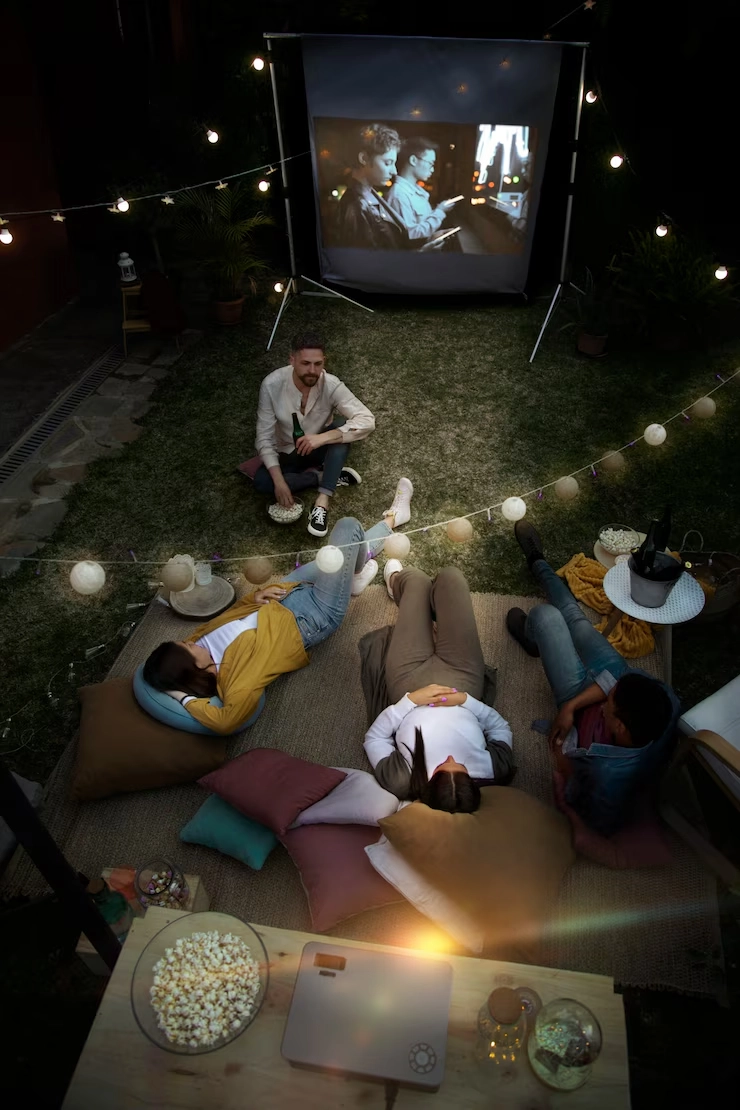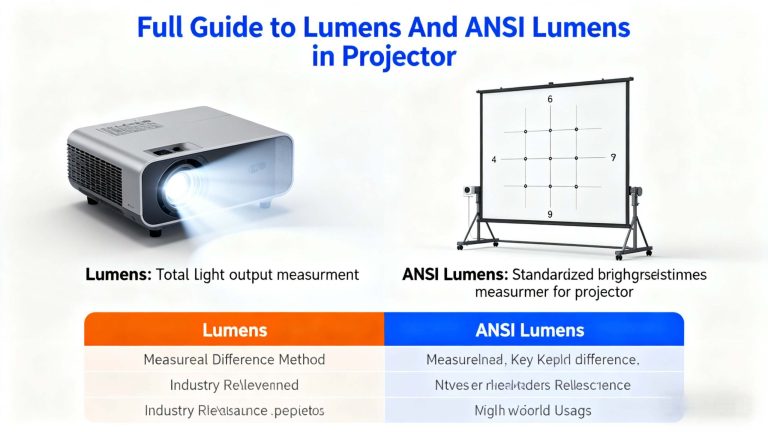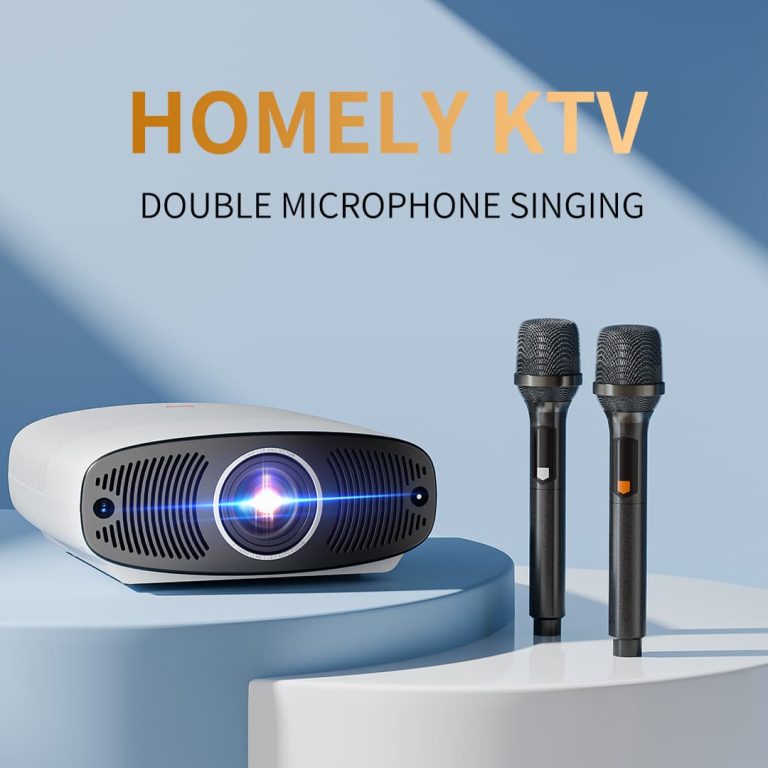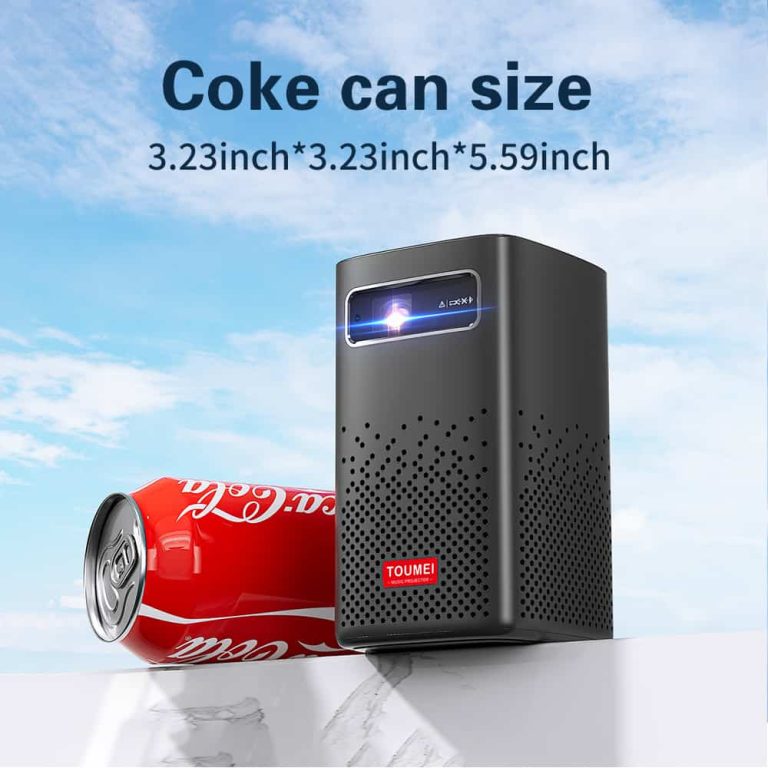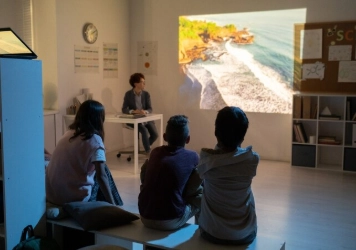
Choosing the right projector lumens can change your viewing experience. This guide makes it easy by exploring how room size, light around you, and projector type affect lumen needs. It also gives tips for different places. Find out why TOUMEI is a trusted source for top-quality, eco-friendly projectors.
What Factors Determine the Ideal Lumen Count for a Projector?
Picking the best lumen count for a projector depends on a few key things that affect brightness and picture clarity. Knowing these helps you choose a projector that fits your needs.
The Relationship Between Room Size and Lumens
The size of your room matters a lot for lumen needs. Big rooms need projectors with more lumens to show clear pictures over long distances. A small bedroom might only need 1,000–1,500 lumens for a sharp image. But a large meeting room could require 3,000–5,000 lumens to keep the picture clear. The distance from the projector to the screen also counts. A longer distance needs more lumens to make the image bright and colorful.
How Ambient Light Impacts Lumen Requirements
The light in a room, like sunlight or lamps, really affects how a projector works. In dark rooms, such as a home theater with thick curtains, 1,000–2,000 lumens can give clear pictures. But in rooms with lots of daylight or bright lights, you need 3,000 lumens or more to beat the glare. For example, a projector in a sunny living room needs higher lumens. This keeps colors bright and details sharp.
The Role of Screen Size in Choosing Lumens
The size of the screen changes how many lumens you need. A bigger screen needs more lumens to stay bright all over. For a 100-inch screen in a dim room, 2,000 lumens might be enough. But for a 150-inch screen in a brighter place, 4,000–5,000 lumens are better. The screen material matters too. Shiny screens can make the picture brighter, so you need fewer lumens. Plain screens might need more lumens for a clear image.
How Do Projector Types Affect Lumen Needs?
Different kinds of projectors are made for specific uses, so their lumen needs vary. Understanding these differences helps you pick the right one.
Differences Between Home Theater and Office Projectors
Home theater projectors focus on picture quality and color in dark rooms. They usually need 1,500–2,500 lumens for dim spaces, like TOUMEI’s S8. This model gives colorful visuals for movie nights. Office projectors, used for talks, need more lumens—often 3,000–4,500—to work in rooms with light. They focus on bright, clear text instead of movie-like colors.
Outdoor Projectors and Their Specific Lumen Requirements
Outdoor projectors deal with tough lighting conditions. In the evening or shaded areas, 2,500–3,500 lumens can work well. But for daylight or early evening, you need 4,000 lumens or more to keep the picture clear. TOUMEI’s Q7 is built for outdoor use. It provides strong lumens for bright visuals even in hard conditions.
Portable Projectors and Their Lumen Capabilities
Portable projectors are small and easy to carry, but they often have fewer lumens, from 500 to 2,000. They’re great for tiny, dark rooms like bedrooms or small gatherings. They may not work well in bright rooms. But their small size makes them popular. TOUMEI’s portable models balance lumens with easy carrying, perfect for quick talks or movie nights.
What Are the Recommended Lumens for Various Settings?
Picking the right lumens depends on where you use the projector. Here are tips for common places.
Optimal Lumens for Home Use
Home projectors need different lumens based on room size and light control.
Living Rooms with Controlled Lighting
Living rooms with curtains or dim lights usually need 2,000–3,000 lumens. This makes pictures clear on 80–120-inch screens. A projector like TOUMEI’s S8 gives the right brightness for family movies or games in rooms with some light.
Bedrooms and Smaller Spaces
Bedrooms are often small and dark, so projectors with 1,000–1,500 lumens work well. These are enough for 60–100-inch screens in low light. Small models from TOUMEI’s product range are great for cozy setups. They give sharp pictures without too much brightness.
Suitable Lumens for Business and Educational Environments
Work and school settings often have bright lights, so they need more lumens for clear pictures.
Conference Rooms with Moderate Lighting
Meeting rooms with some sunlight or lamps need 3,000–4,000 lumens. This keeps text and pictures clear on 100–150-inch screens during talks. TOUMEI’s high-lumen projectors are made for work settings. They give steady performance.
Classrooms with Bright Lighting Conditions
Classrooms with big windows or bright lights need 4,000–5,000 lumens. These projectors must beat room light to show lessons clearly. TOUMEI’s strong models help teachers share engaging lessons with bright pictures.
Ideal Lumens for Outdoor Projections
Outdoor projections need lots of lumens to handle natural light. For evening setups, 2,500–3,500 lumens work well on 100–150-inch screens. But daylight needs 4,000–6,000 lumens for clear pictures. TOUMEI’s Q7 is great for outdoor events. It offers strong brightness for things like backyard movie nights.
| Place | Lumens Needed | Screen Size | Light Conditions |
| Living Room | 2,000–3,000 | 80–120 inches | Controlled |
| Bedroom | 1,000–1,500 | 60–100 inches | Low |
| Meeting Room | 3,000–4,000 | 100–150 inches | Moderate |
| Classroom | 4,000–5,000 | 100–150 inches | Bright |
| Outdoor (Evening) | 2,500–3,500 | 100–150 inches | Low to Moderate |
| Outdoor (Daylight) | 4,000–6,000 | 100–150 inches | High |
Why Is TOUMEI a Reliable Projector Supplier?
TOUMEI is a leading name in projectors, offering new and green solutions for many needs.
Diverse Range of Options for Different Needs
TOUMEI has many projectors, from small portable ones to strong outdoor models. Their product range includes choices for home movies, work talks, and outdoor events. They fit every budget and need.
Customer Satisfaction and Global Recognition
TOUMEI cares about customers, offering quick help and good warranties. Their projectors are loved worldwide, with awards like CE and RoHS showing their quality. Happy users praise TOUMEI for steady performance and good value.
Conclusion
Picking the right projector lumens depends on room size, light around you, screen size, and projector type. Home theaters do well with 1,500–3,000 lumens. Offices and classrooms need 3,000–5,000 lumens to handle bright light. Outdoor setups require 2,500–6,000 lumens for clear pictures. Knowing these factors helps you choose a projector that makes your viewing better. TOUMEI offers many high-quality, planet-friendly projectors, from the small S8 to the strong Q7. They fit every need. Whether for movie nights, work talks, or outdoor events, TOUMEI’s smart solutions give bright, clear images. Choose wisely to improve your projections with TOUMEI’s trusted tech.
FAQs
How Many Lumens Are Needed for a Daylight Projection?
Daylight projections need lots of lumens to beat bright light. For outdoor or sunny indoor places, 4,000–6,000 lumens give clear, colorful pictures on 100–150-inch screens.
Can a High-Lumen Projector Be Used in Small Rooms?
Yes, high-lumen projectors can work in small rooms. But they might be too bright in dark places. For bedrooms, 1,000–2,000 lumens are usually enough.
What Is the Lifespan of a High-Lumen Projector Lamp?
High-lumen projector lamps, especially LEDs, last 20,000–30,000 hours. This means years of use with little care. TOUMEI’s projectors use strong LED tech. They give long-lasting performance for home or work.


